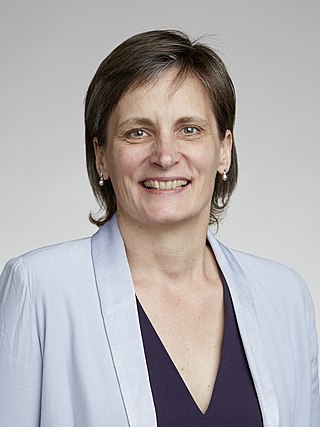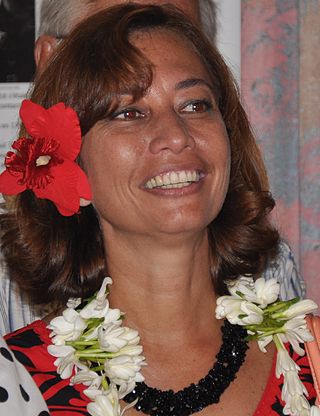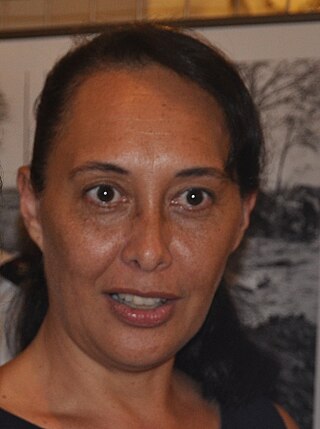Related Research Articles

Marie Salomea Skłodowska–Curie was a Polish and naturalized-French physicist and chemist who conducted pioneering research on radioactivity. She was the first woman to win a Nobel Prize, the first person to win a Nobel Prize twice, and the only person to win a Nobel Prize in two scientific fields. Her husband, Pierre Curie, was a co-winner of her first Nobel Prize, making them the first-ever married couple to win the Nobel Prize and launching the Curie family legacy of five Nobel Prizes. She was, in 1906, the first woman to become a professor at the University of Paris.

Pascale Cossart is a French bacteriologist who is affiliated with the Pasteur Institute of Paris. She is the foremost authority on Listeria monocytogenes, a deadly and common food-borne pathogen responsible for encephalitis, meningitis, bacteremia, gastroenteritis, and other diseases.

Anna Cooke Kendrick is an American actress. Her first starring role was in the 1998 Broadway musical High Society, for which she earned a nomination for the Tony Award for Best Featured Actress in a Musical. She made her film debut in the musical comedy Camp (2003), and had a supporting role in The Twilight Saga (2008–2012). She achieved wider recognition for the comedy-drama film Up in the Air (2009), which earned her a nomination for the Academy Award for Best Supporting Actress, and for her starring role in the Pitch Perfect film series (2012–2017).

Françoise Barré-Sinoussi is a French virologist and Director of the Regulation of Retroviral Infections Division and Professor at the Institut Pasteur in Paris, France. Born in Paris, France, Barré-Sinoussi performed some of the fundamental work in the identification of the human immunodeficiency virus (HIV) as the cause of AIDS. In 2008, Barré-Sinoussi was awarded the Nobel Prize in Physiology or Medicine, together with her former mentor, Luc Montagnier, for their discovery of HIV. She mandatorily retired from active research on August 31, 2015 and fully retired by some time in 2017.

Anna Bella Geiger, is a Brazilian multi-disciplinary artist of Jewish-Polish ancestry, and professor at the Escola de Artes Visuais do Parque Lage. She lives in Rio de Janeiro, and her work, characterized by the use of different media, is held by galleries and private collections in the US, China, Brazil and Europe.

The University of French Polynesia is a French university located in Puna'auia, French Polynesia.
Sir Stewart Thomas Cole is a British/French microbiologist. He has been the director general of the Pasteur Institute since January 2018.

Pitch Perfect is a 2012 American musical comedy film directed by Jason Moore and written by Kay Cannon. It features an ensemble cast, including Anna Kendrick, Skylar Astin, Rebel Wilson, Adam DeVine, Anna Camp, Brittany Snow, Hana Mae Lee, Alexis Knapp, Ester Dean, Kelley Jakle, Shelley Regner, Wanetah Walmsley, Ben Platt, Utkarsh Ambudkar, John Michael Higgins, and Elizabeth Banks. The plot follows Barden University's all-girl a cappella group, the Barden Bellas, as they compete against another a cappella group from their college to win Nationals. The film is loosely adapted from Mickey Rapkin's non-fiction book, titled Pitch Perfect: The Quest for Collegiate a Cappella Glory and director Jason Moore's own experiences at his alma mater, Northwestern University. Filming concluded in December 2011, in Baton Rouge, Louisiana.

Christine Petit is a French geneticist. She holds professorships at the Collège de France and the Pasteur Institute.

Marie Corinne Lyne Le Quéré is a French-Canadian scientist. She is Royal Society Research Professor of Climate Change Science at the University of East Anglia and former Director of Tyndall Centre for Climate Change Research. She is the chair of the French High Council on Climate and member of the UK Climate Change Committee. Her research focuses on the interactions between the carbon cycle and climate change.

Emmanuelle Marie Charpentier is a French professor and researcher in microbiology, genetics, and biochemistry. As of 2015, she has been a director at the Max Planck Institute for Infection Biology in Berlin. In 2018, she founded an independent research institute, the Max Planck Unit for the Science of Pathogens. In 2020, Charpentier and American biochemist Jennifer Doudna of the University of California, Berkeley, were awarded the Nobel Prize in Chemistry "for the development of a method for genome editing". This was the first science Nobel Prize ever won by two women only.
Pylore Krishnaier Rajagopalan is an Indian vector control scientist, biologist and acarologist, known for his pioneering contributions to the control programmes against vector-borne diseases in India. He is a former director of the Indian Council of Medical Research managed Vector Control Research Centre, Pondicherry. He graduated in 1949 from the Banaras Hindu University and obtained a Masters in Zoology with University First Rank there itself in 1951. In 1952 he joined the fledgling Virus Research Centre in Pune, and worked under the supervision of some of the finest vector control specialists such as Dr T Ramachandra Rao. In recognition of his outstanding work as a young research scientist, in 1957 he was awarded a Fellowship by the Rockefeller Foundation to pursue a Master's program in Public Health from the University of California. He went on to secure a Diploma in Acarology from the University of Maryland at College Park.

Isabella Khairiah Hadid is an American model. Throughout her career, she has made 29 appearances on international Vogue covers. In 2022, she was named Model of the Year by the British Fashion Council. Time magazine named her one of the 100 most influential people in the world on its annual list in 2023.

Yasmine Belkaid is an Algerian immunologist and senior investigator at the National Institute of Allergy and Infectious Diseases (NIAID) and adjunct professor at the University of Pennsylvania. She is best known for her work studying host-microbe interactions in tissues and immune regulation to microbes. Belkaid currently serves as the director of the NIAID Microbiome program. On 29 March 2023, she was appointed as President of the Pasteur Institute for a six-year term, starting from January 2024.
Anne-Marie Staub was a French biochemist who spent most of her career at the Institut Pasteur. She is most known for her work in antihistamines, serology and immunology including her research on Salmonella and tyvelose.

Maria Odette Santos Ferreira was a Portuguese professor of microbiology who played an important role in research on HIV, through the identification of the HIV-2 virus in association with the Pasteur Institute of Paris. She was also the coordinator of the Portuguese programme to fight AIDS, overseeing the "Say no to a second-hand syringe" project, which resulted in the collection and exchange by pharmacies of 43 million used syringes between 1993 and 2008.

Nicole Sanquer is a French Polynesian politician, and former Cabinet Minister. She was a member of the French National Assembly from 2017 to 2022. Elected as a member of Tapura Huiraatira, she sits in the UDI and Independents group in the French Parliament. In 2020 she formed the A here ia Porinetia party.

Tea Priscille Frogier is a French Polynesian civil servant, politician and former Cabinet Minister. She is a member of Tapura Huiraatira.
Suzanne Chanteau is a French Polynesian medical researcher who directed the Pasteur Institute in New Caledonia from 2008 to 2013. She is notable for developing rapid diagnostic tests for plague, cholera, and bacterial meningitis.
Eliane Chungue is a French Polynesian medical researcher and former director of the Malardé Institute.
References
- ↑ "Ces chercheurs polynésiens qui font avancer la science mondiale" (in French). Tahiti Infos. 25 August 2017. Retrieved 6 May 2023.
- 1 2 3 4 "Anna-Bella Failloux promue professeure à l'Institut Pasteur" (in French). Tahiti Infos. 21 February 2019. Retrieved 6 May 2023.
- ↑ "Anna-Bella Failloux". The Conversation. Retrieved 6 May 2023.
- 1 2 "Anna-Bella Failloux s'est vue attribuer sa Légion d'Honneur" (in French). Tahiti Infos. 19 October 2015. Retrieved 6 May 2023.